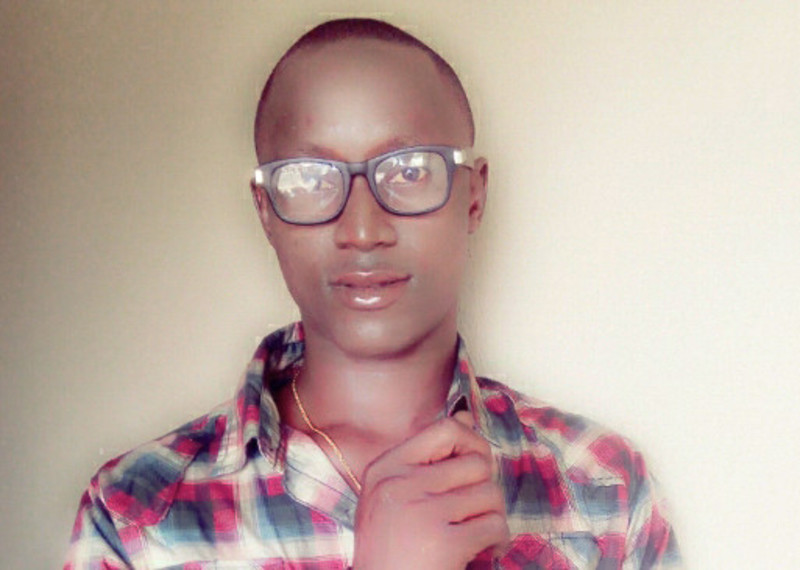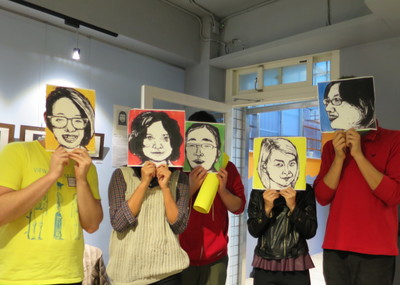1. We helped Moses, a torture survivor on death row, get pardoned in Nigeria
After nearly 10 years in jail, and over 800,000 letters of support from activists around the world, Moses Akatugba’s life was spared. Emmanuel Uduaghan, the Governor of Delta State, used his last day in office to grant Moses a total pardon on 28 May 2015.
Moses was imprisoned and tortured in 2005 and later sentenced to death by hanging for stealing mobile phones – a crime he denies. He thanked everyone who supported him: “Amnesty International members and activists are my heroes.”
He also promised to become a human rights activist himself: “I’m joining the fight against torture so that others will not go through the pain that I did.”

2. We pushed EU leaders to stop people drowning in the Mediterranean
When as many as 1,200 refugees and migrants drowned in two shipwrecks during just one week in April, hundreds of thousands of people stood up to protest. And finally, Europe’s politicians faced the fact that the Mediterranean Sea is turning into a cemetery.
After holding emergency meetings it proposed a new plan which includes stepping up search and rescue operations. This could mean a small, important step forward – if all member states back it fully.
Thank you to the around 500,000 people who signed our #SOSEurope campaign petition, sending a loud and clear message to EU leaders.
3. We celebrated Ireland’s resounding YES! to full marriage equality
Ireland became the first country in the world to introduce full civil marriage equality through a referendum for all its people, regardless of their sexual orientation, on 23 May – captured in the image at the top of this story. Amnesty Ireland campaigned for a Yes vote: “This decision is enormously important,” said its Executive Director, Colm O’Gorman.
“It will obviously have profound significance to people here in Ireland, but it will also echo around the world. It sends a message to LGBTI people everywhere that they, their relationships and their families matter.”
4. We spoke out to #FreeTheFive in China
The Chinese authorities released five women’s rights activists on bail on 13 April, following a worldwide campaign for their freedom. Amnesty coined the #FreetheFive hashtag soon after the women – Wei Tingting, Wang Man, Wu Rongrong, Li Tingting and Zheng Churan – were arrested and detained on 7 March. Their “crime”? Planning to campaign publicly against sexual harassment on International Women’s Day.
“The decision to release all five women is an encouraging breakthrough,” said Amnesty’s China researcher, William Nee. “The authorities must now follow through and drop all charges and restrictions against the women.”
5. We brought about an historic breakthrough on transgender rights in Norway
Transgender people in Norway should no longer be forced to trade invasive treatment for having their gender legally recognized, an expert committee announced on 10 April 2015. This followed our global campaigning for John Jeanette Solstad Remø – a transgender woman and vocal activist featured in Amnesty’s Write for Rights 2014 campaign.
“This is everything I have dreamt of and hoped for,” she told us. “It was worth the fight. Without Amnesty’s support we wouldn’t have got to where we are today.”
I’m joining the fight against torture so that others will not go through the pain that I did.
Moses Akatugba, activist and torture survivor
6. We made sure Jerryme’s torture will be investigated
The Philippines police announced in late March that letters sent by a “human rights organisation” – which we can confidently say is Amnesty International – have prompted them to investigate the shocking torture of Jerryme Corre, who was electrocuted, punched and threatened with death.
Amnesty Philippines delivered thousands of signatures collected during our Write for Rights 2014 campaign to the police on 27 March. Immediately afterwards, the police informed Jerryme and his family that an investigation would be opened. And on 6 April, Amnesty attended the first investigation hearing alongside Jerryme and his representatives.
7. We campaigned until Omar was finally released on bail
When Omar Khadr left a courthouse in Alberta, Canada with his long-time lawyer Dennis Edney on 7 May 2015, it was his first taste of freedom after almost 13 years behind bars – mostly spent in the notorious US Guantánamo prison.
Omar was just 15 when US forces captured him in Afghanistan in 2002. Amnesty activists worldwide have campaigned for his rights ever since – you can send him a message of support right now.
8. We helped Italy’s Roma win a landmark victory
An Italian court ruled in May that moving Romani families to an ethnically segregated camp outside Rome was illegal. This landmark verdict follows years of Amnesty campaigning alongside others to stop Italy’s Romani people being forcibly evicted, segregated and discriminated against.
The Rome authorities effectively forced many Roma families into an isolated camp of pre-fabricated containers in 2012. Many had their existing homes destroyed. Thanks to everyone who supported our campaign – we will keep pushing for Romani people to get the same housing options as everyone else.
9. We’re making the death penalty history in the USA
Nebraska voted to abolish the death penalty on 27 May 2015, becoming the 19th US state without this inhumane punishment. “This couldn’t have happened without the hard work of groups dedicated to ending state barbarism,” said Christy Hargesheimer, Death Penalty Action Coordinator for Amnesty USA.
“The tidal wave of abolition is continuing to sweep over the United States, and soon the death penalty will be relegated to the history books where it belongs. Who’s next?”
10. Our letters finally reached Erkin, a torture survivor in Uzbekistan
As soon as we found out that letters were not being passed to Erkin Musaev, tortured and imprisoned since 2006 in Uzbekistan, we complained to the prison director. Erkin was then allowed to read a few letters in the presence of prison administration staff, before giving them back.
Erkin and his family say a huge “thank you!” to all Amnesty activists who have sent them messages of support, including during Write for Rights 2014: “Erkin says that every letter means a lot to him and gives him strength, optimism and faith.”
11. We put the UAE in the spotlight until it released three disappeared sisters
After a global social media outcry, Asma, Mariam and Alyazia al-Suwaidi were released from secret detention on 15 May. Having tweeted about their brother’s unfair trial, the sisters were questioned by United Arab Emirates police in February and disappeared for three months.
“These three women should never have been detained,” stated Amnesty’s Said Boumedouha. “It is a chilling act of repression for the state to silence activists’ families by locking them up for months, with no access to their loved ones or the outside world.”
12. We celebrated again as #LoveWins in the USA
#LoveWins became the global hashtag of choice on 26 June, when the US Supreme Court delivered a historic ruling affirming same-sex couples’ legal right to marry.
“This is a joyous day not just for loving and committed same-sex couples, but for everyone who believes in human rights and equality for all,” said Steven W. Hawkins, executive director of Amnesty International USA.
“The ability to marry the partner of your choice and raise a family is a human right enshrined in international law. This long-awaited and significant decision affirms that same-sex couples and their families deserve the same respect and recognition as anyone else.”
13. We helped free two men in Swaziland
Bhekithemba Makhubu and Thulani Maseko were finally released in Swaziland on 30 June after spending 15 months in prison. Thousands of Amnesty activists from around the world had campaigned for the two prisoners of conscience, sending thousands of letters to support them. Both their families thanked Amnesty’s members for remembering them during their darkest days.
Bheki and Thulani were imprisoned in March 2014 and were serving a two-year sentence for contempt of court after a blatantly unfair trial. They were convicted for publishing articles in The Nation magazine which raised concerns about the lack of judicial independence and integrity in Swaziland.
14. And finally… we pushed Cameroon to release 84 children
Following pressure from Amnesty, the Cameroon authorities started releasing 84 children on 24 June. They had been detained for six months after being rounded up last December during a raid by the security forces on a Quranic school, carried out under the guise of countering the armed group Boko Haram.
On 30 June, we were able to confirm that all the children had been released from the detention centre for minors in the town of Maroua.
Read more
Pure people power: 10 human rights successes so far in 201524 of our biggest moments in 2014
Download the latest issue of Amnesty’s global magazine, Wire.


